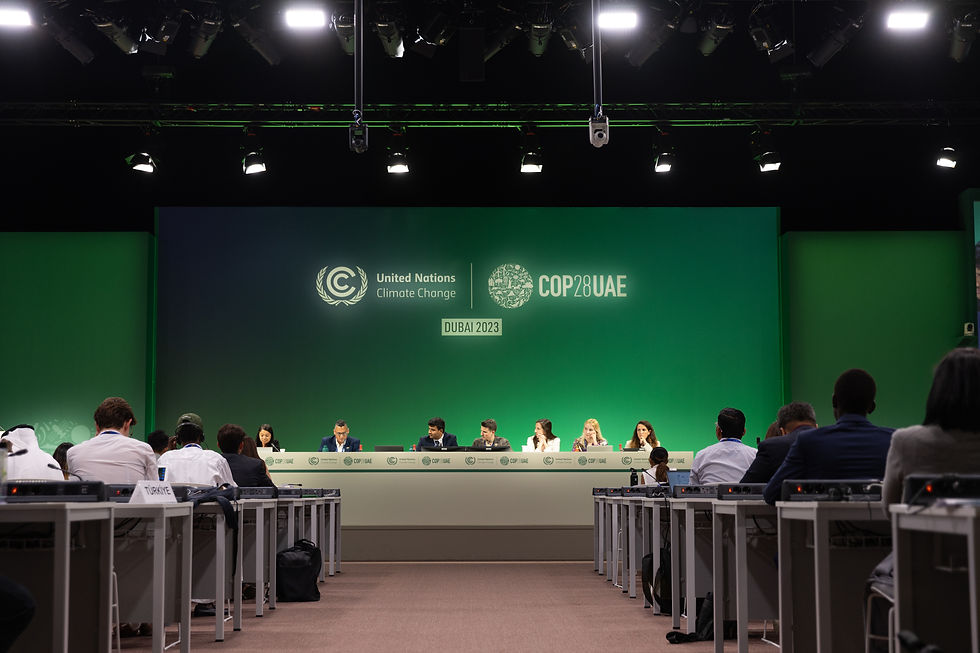Balancing Act: Paula Naoufal’s Insights on the Intersection of Climate Action, Business, and Journalism
- Angelik Nehme
- Aug 6, 2024
- 5 min read
A conversation with a Senior Reporter at CNN Business Arabic
Author: Angelik Nehme
As climate change intensifies, businesses and financial markets are increasingly concerned with shifting towards more sustainable approaches. This transition requires adopting greener practices and balancing economic growth with environmental responsibility. The urgency of this transition is evident, especially in the global carbon targets shaping corporate strategies and investment decisions. Against this backdrop, journalists are crucial in informing and shaping public discourse around complex climate and business endeavours.
In this context, The Conference Corner spoke with award-winning journalist Paula Naoufal, Senior Reporter at CNN Business Arabic, who has covered major events like OPEC+ meetings, COP, and the World Economic Forum at Davos. Her expertise in financial and climate-related news and her academic background in Risk Analysis and ongoing PhD studies offer valuable insights into the interconnected fields of journalism, climate action, and business profitability.

On the Trends and Developments in Climate Change
The emphasis on a fair and equitable transition to renewable energy is a trend that has caught Paula's attention. She highlights, "The challenge here lies in balancing the gradual shift away from fossil fuels without harming developing nations."
She argues that Western countries that have already hit their energy and industrial peaks, making economic strides while significantly contributing to global pollution, are asking other countries to make rapid transitions, which seems unrealistic.
"Developing nations need time to build their economies sustainably without being forced into an immediate and possibly detrimental shift."
According to a 2021 International Energy Agency (IEA) report, annual investments in clean energy within developing economies need to surpass $1 trillion by 2030 to ensure the world remains aligned with achieving net-zero emissions by 2050.
On Challenges for Businesses and Financial Markets Sustainability Transition
Paula sheds light on the various challenges businesses and financial markets face, including regulatory uncertainties, the high initial costs of sustainable technologies, and the difficulty of measuring and reporting sustainability metrics.
Moreover, S&P Global Commodity Insights projects that clean energy technology investments will reach nearly $800 billion in 2024, representing a 10% to 20% increase compared to spending levels in 2023.
According to Paula, resolving these issues requires clear, stable policies that support long-term investment in green technologies, financial incentives to offset initial costs and standardised frameworks for sustainability reporting. She also highlights the importance of Public-private partnerships, which can "play a crucial role in mitigating challenges by sharing risks and resources."
On Strategies to Balance Environmental Concerns with Business Profitability
In these critical times, businesses must balance profitability with sustainability, ensuring long-term success while addressing environmental concerns. Paula finds that an effective strategy to attain this balance is the integration of sustainability into core business operations, where companies adopt circular economy principles, reducing waste and maximising resource efficiency.
Furthermore, initiatives like sustainable supply chain management and green product innovation address environmental concerns, create new market opportunities and enhance brand reputation. She finds that companies that successfully balance profitability and sustainability often adopt a long-term perspective, viewing environmental stewardship as a competitive advantage and resilience driver.
In early 2020, sustainable investments globally amounted to $35.3 trillion across five major markets, marking a 15% growth from 2018.
On Potentially Promising Solutions
Paula sees carbon capturing as a promising emerging technology. This is a technique by which carbon dioxide emissions from industrial sources are captured and stored, significantly reducing greenhouse gases in the atmosphere.
"Investment in these technologies (carbon capturing), along with advancements in renewable energy sources like solar and wind, can drive substantial positive climate action."
Additionally, she highlights that green bonds and sustainable investment funds are gaining traction as financial instruments that support environmental projects while offering returns to investors. In 2023, the projected carbon capture and announced storage capacity rose by 35% and 70%, respectively. This expansion means that by 2030, roughly 435 million tonnes of CO2 could be captured annually.
On the Influence of International Conferences on Policies
Regarding the significance of international events, Paula finds conferences like Davos and COP to be enablers of political action when it comes to policy and investment decisions, as they bring together leaders from governments, businesses, and civil society.
Furthermore, they facilitate the exchange of ideas, foster collaborations, and set agendas for climate action. They can also "drive policy commitments and encourage investments in sustainable projects by highlighting successful case studies, setting ambitious targets, and providing a space for dialogue and negotiation."
The significance of such conferences in the COP 28 Global Renewables and Energy Efficiency Pledge, supported by 130 governments, aiming to triple renewable energy capacity and double energy efficiency advancements by 2030.
On Memorable Experiences
Paula shares that covering COP28 was a particularly memorable experience for her since she heard first-hand from government officials, private sector leaders, and NGOs about their initiatives and challenges, providing a comprehensive view of the global effort needed to tackle climate change.
"This experience reinforced the importance of journalism in holding stakeholders accountable, disseminating critical information, and inspiring action through stories of innovation and resilience," Paula adds.
On Media and Public Opinion
Paula is vocal about the critical role of the media in shaping public understanding by providing accurate information, framing the narrative, and highlighting the urgency of environmental issues.
She suggests that the media can educate the public about the complexities of climate change, its impacts, and potential solutions through journalism, feature stories, and expert interviews. Moreover, Paula highlights that "media coverage can influence public opinion, and, consequently, policy decisions by raising awareness and fostering public discourse."
Furthermore, A 2023 IPCC report underscores the importance of enhanced awareness, as it mentions that heightened public and political awareness of climate effects and risks has prompted over 170 countries to integrate adaptation measures into their climate-related policies.

On Best Journalistic Practices
Journalism requires navigating complex information clearly and respectfully by breaking technical information into accessible language without oversimplifying the content.
In this regard, Paula's methods include prioritising thorough research, cross-referencing multiple credible sources, and consulting with experts to ensure accuracy.
Furthermore, she highlights that "ensuring a balance between factual reporting and narrative appeal is crucial for maintaining both accuracy and engagement," which helps create impactful journalism.
Additionally, she engages her audience through compelling storytelling techniques, a strong narrative arc, visual aids, and relatable examples. Her essential tips include rigorously maintaining integrity and objectivity, verifying facts, and developing a clear and concise writing style. She also underscores the vitality of "building relationships with credible sources and staying informed about industry trends."
On the Future
The path to addressing climate change is simultaneously challenging and filled with opportunities. Reliable journalism and media sources are a cornerstone for the fight against climate change, as access to information and happenings is paramount.
Regarding climate change and the future, Paula Naoufal is cautiously optimistic, citing growing awareness, technological advancements, and increasing investments in sustainable solutions as reasons for hope.
She advises young individuals keen on pursuing journalism to stay curious and educate themselves on the latest developments, emphasising the importance of building a solid network of experts and sources. In conclusion, with concerted efforts from governments, businesses, and the media, we can pave the way for a resilient and sustainable global economy. The path to a sustainable future is within reach, driven by innovation, accountability, and collaboration.
------------
Featured images provided by Paula Naoufal.
Image:




Comments